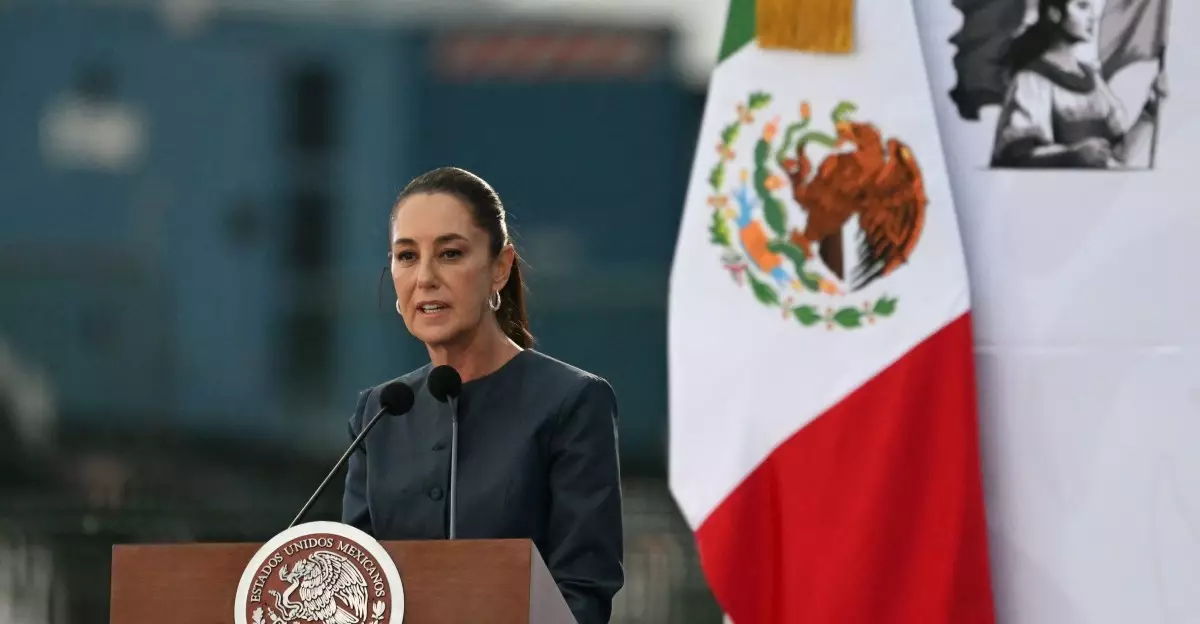In an era where geopolitical tensions can shift with a single executive order, the recent standoff between Mexico and tech giant Google over the naming of the Gulf of Mexico illuminates the complexity of national identity and digital cartography. Mexican President Claudia Sheinbaum’s bold move to sue Google for labeling the body of water as the “Gulf of America” for U.S. users sets a significant precedent for how countries can challenge corporate authority over geographical representations. This lawsuit is not merely a legal tussle; it embodies a battle for national pride and respect for international naming conventions—a vital issue that transcends borders.
A Political Statement in the Digital Realm
At the heart of Sheinbaum’s grievance lies a deeper geopolitical concern: the implications of a name change authorized by a former U.S. president. Her statements reflect a clear understanding of sovereignty and the delicate balance of power when a tech company, even at the behest of a government, can redefine geographical standards. By stating, “the only thing we want is compliance with the decree issued by the United States government,” she is not only aiming for legal conformity but also emphasizing Mexico’s right to its territorial identity. This assertion affirms that while parts of the Gulf may fall under U.S. jurisdiction, the naming rights of international waters belong to the collective agreement of nations involved—Mexico being a primary stakeholder.
Corporate Compliance and National Identity
The response from Google, which initially altered the name on Google Maps, serves as a poignant example of how technology companies can inadvertently step into political quagmires. In a world where app developers and tech giants wield unprecedented influence over everyday experiences and perceptions, critics argue that their compliance with political directives can distort historical and geographical truths. Sheinbaum’s insistence on reverting to the traditional “Gulf of Mexico” illustrates a critical need for digital platforms to operate with cultural sensitivity, questioning whether tech firms should act as arbiters of identity or simply convey factual information.
The Historical Context and Future Implications
This naming conflict is also steeped in historical narratives that extend far beyond recent presidential administrations. Throughout history, the renaming of geographical locations has often signified power shifts and cultural dominance, a trend that Sheinbaum and her administration are keenly aware of. By invoking the legality of international attributions, they not only protect Mexico’s image but also set a standard for future disputes involving sovereignty and representation in the digital age. As the U.S. House pushes forward with legislation to codify Trump’s name change, the implications of this conflict could resonate well beyond the Gulf, touching on broader issues of cultural imperialism in an increasingly interconnected world.
Public Sentiment and Media Response
Public reaction to this diplomatic issue has been as varied as the stakeholders involved. While some Mexicans rally behind Sheinbaum’s firm stance, seeing it as a necessary defense of national pride, others question the practicality of such a suit in a digital world dominated by U.S. tech firms. Moreover, the media’s portrayal of this renaming controversy provides an avenue for public engagement, allowing citizens to reflect on their national identity and the role technology plays in shaping that identity. The controversy extends into humor as well, with MapQuest maintaining a sense of rebellion by refraining from adopting the new name. This highlights a unique dynamic in how corporations can resist or comply with national agendas and what that says about their corporate values.
Legal Ramifications and International Relations
As Sheinbaum’s administration presses on with legal action against Google, the broader implications for international relations and corporate governance are significant. The outcome of this case could set a precedent for future disputes between nations and corporations, illustrating how digital landscapes can influence traditional diplomatic channels. If successful, Sheinbaum’s lawsuit may empower other nations facing similar issues, encouraging them to assert their identity in an era where tech companies dominate the narrative landscape. This evolving digital frontier poses a pressing question for countries worldwide: who truly holds the rights to name their world in an interconnected age, and what does that mean for cultural heritage in the face of globalized tech?


Leave a Reply